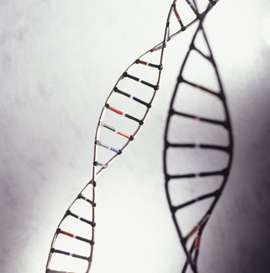Can you turbo-charge your genes to produce 'designer babies'?

If you have bad skin or are losing your hair you might jokingly blame your parents for passing on the genes that cause these problems. Of course, most traits that you've inherited probably developed many generations ago. But research is increasingly revealing another level of inheritance at work that really could be down to your parents.
Epigenetics is the study of how our genes can be read differently or turned on or off depending on external factors. It explains why identical twins are not completely identical. With time and age they begin to differ epigenetically, leaving them susceptible to different looks, different diseases and ultimately different causes of death (not including accidents).
Our environment, diet – and even the people we interact with – can alter the epigenetics of the way our genes are expressed. The molecules of our DNA sequence remain the same in each type of cell, but the various epigenetic marks that tell cell proteins how to process certain parts of the DNA can do so in different ways. For example, through one of these mechanisms known as DNA methylation, tiny molecules bind to one element of DNA and can potentially shut neighbouring genes down, affecting the cell's identity. This means that the interpretation of genes is not "fixed" and can be influenced by the environment through epigenetic traits.
Fitter, happier?
Some research has even shown that epigenetic changes can be passed on to our children. This raises the question of whether our genes could be improved for the next generations? Could we have taller, fitter and more intelligent children by making changes to our own lives? The simple answer is we don't yet know. But tantalising studies indicate that the potential is there. Certainly evidence suggests that individuals with unhealthy lifestyles can produce unhealthy children.
One 2013 study, for example, used two groups of male mice to investigate the effects of parent's lifestyle on their children and grandchildren. One group of mice was given a high-fat "junk food" diet and the other was fed a controlled, nutritious diet for 10 weeks. All these male mice were then mated with control-fed female mice to produce offspring, who were again mated with control-fed mice to produce a second generation.
The study found the descendants of the "junk food" diet mice were more likely to be obese, even though their own diet was controlled. Studying the sperm of the mice indicated that the cause of this was not mutations in the DNA but epigenetics, the way the genes were expressed.
In another similar study, one group of male mice received a high-fat diet and the other received a normal, healthier diet. The results showed that the offspring of the parents who were fed the healthier diet had reduced glucose intolerance and insulin resistance, which are characteristics for developing diabetes.
These findings suggest that lifestyles and diet of parents can have vital effects on their children and grandchildren. Specifically they suggest poor diets lead to less healthy children, but they also raise the possibility that improving your lifestyle could give your genes the best possible chance of being expressed in a healthy way after they are passed on.
Genetic remodelling
Aside from epigenetics, there are other ways you can act that may give your children the best possible genetic headstart. Research shows that the more distantly related you are to your partner, the taller, smarter and more successful at school your children are likely to be. However, researchers haven't yet proved that the greater genetic difference between the parents is the cause of the children's improved scores or how much of this outcome is down to environmental or other factors.
In the future, we may even see methods emerge for redesigning your DNA to eliminate heritable diseases or make other changes to your genetic make-up. Recently, a powerful gene editing technique called CRISPR has rapidly progressed. It uses the natural immune defences of bacteria to produce "molecular scissors" that can remove or even replace parts of a DNA sequence with tremendous accuracy. If changes were made to DNA in sperm or egg cells, they could be permanently sealed into the genetic line and passed on to future generations – although just what genes can be successfully altered remains to be seen.
However, the notion of editing human embryos (or sex cells) is a controversial region of science and research. There are constant debates and discussions around this topic to try to answer the ethical and regulatory questions created by such procedures. While it would be immensely advantageous to treat inherited disorders, if such research were not properly regulated it could be exploited for non-therapeutic alterations and raise the spectre of "designer babies".
This article was originally published on The Conversation. Read the original article.
![]()


















